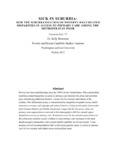Sick in Suburbia: How the Suburbanization of Poverty Has Created Disparities in Access to Primary Care Among the Metropolitan Poor

View/
Author
Lee, Donaldson Cameron
Subject
Washington and Lee University, Shepherd Poverty Program
Suburbs -- Economic aspects
Suburbs -- Social conditions
Primary health care -- Finance
Poverty
Social justice
Metadata
Show full item recordDescription
Donaldson Cameron Lee is a member of the Class of 2017 of Washington and Lee University. Capstone; [FULL-TEXT FREELY AVAILABLE ONLINE] Poverty has been suburbanizing since the 1990's in the United States. This metropolitan trend has created disparities in access to primary care between the urban and suburban poor, introducing additional barriers to access for low-income individuals in the suburbs. This differential access is characterized by disparities in spatial access, health insurance coverage, and language and cultural barriers. Using social justice frameworks from Norman Daniels and Martha Nussbaum, I argue that the failure by safety net primary care organizations to respond to this demographic shift has created unjust disparities in access to primary care. Worsened access for the suburban poor relative to the urban poor signifies society's failure to place primary care resources in the most disadvantaged communities and to secure health capability for all individuals. I then propose several recommendations that would ensure greater equity in access to primary care for low-income individuals across metropolitan areas. Cameron Lee